This documentary gives some very valuable insights into the life and works of Sean O’Casey. It is well worth a watch for students currently studying ‘The Plough and the Stars’.
First year debate
A massive congratulations to class 1A3 which has emerged as the champions from last Friday’s 1st year debate. The three debates were hotly contested and many excellent speakers demonstrated their talent in trying to convince us of the merits of their given topic.
The first debate:
That city life is better than country life.
1A2 was represented by Luka McGrath, Jack Taaffe and Abdul Mhueez Olaosebikan for the proposition and 1A1 was represented by Rapha Diamond-Ebbs, Louis Mbikakeu and Evan Logue for the opposition. With well-researched and informative speeches, the motion was narrowly defeated.
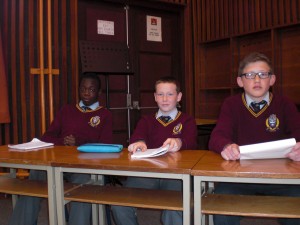
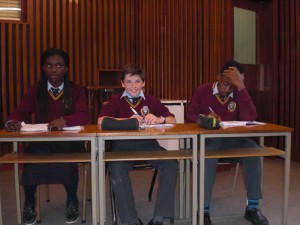
The second debate:
That teenagers spend too much time on computers.
This motion saw 1A3 achieve their first victory with very well delivered speeches from Yasmin Hanratty, Emma Mullen and David Alabi for the proposition. Val Farrell, Ignas Prakapas and Anthony Ryan valiantly opposed the motion for 1A2.

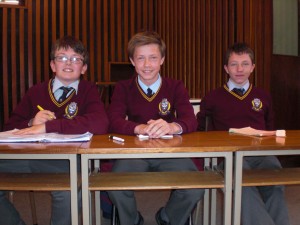
The third debate:
That history is an important subject in school.
The history department at Franciscan College Gormanston heaved a collective sigh of relief as this motion was carried. The debating talents of 1A3 were again on display through the persuasive skill of Ruth Flanagan, Megan O’Toole and Sarah-Jane Byrne. The proved to be too skillful for the courageous debaters of 1A1 – Sarah Browne, Edward Hamilton and Ewan Costigan.
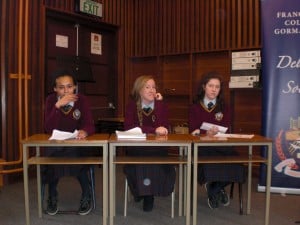
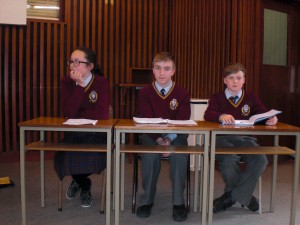
The amount of preparation put into each of the speeches was clear to see and this was a contest that every team wanted to win. The speakers did themselves and their teachers proud and we look forward to many more heated debates as these very hard working classes move into second year.
All first years attended the debates and the students who did not have the opportunity to represent their class this year are very eager to do so next year.
All first years would like to extend a very sincere thank you to Ms Ryan and Mr Buckley who were faced with the very difficult task of adjudicating all three debates and to Eoin Gormley and Sean Landers from 5th year who were our very capable Chairperson and Timekeeper.
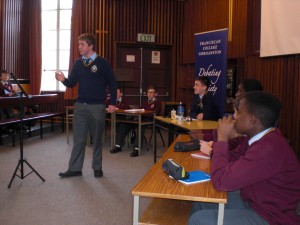
Past exam questions on the poetry of Thomas Hardy
The poetry of Thomas Hardy has been examined only twice in the past 20 years – that was in 2006 and 1998. Here are the questions that were asked:
2006
‘What Thomas Hardy’s poetry means to me.’
Write an essay in response to the above title.
Your essay should include a discussion of his themes and the way he expresses them. Support the points you make by reference to the poetry on your course.
1998
‘Hardy’s poetry is striking in its lyrical expression of the joys and misfortunes of life.’
Discuss this statement, supporting your answer by quotation from or reference to the poetry by Hardy on your course.
‘The King’s Speech’ – the real speeches
Here is The Duke of York’s speech for the closing of the Empire Exhibition in 1925.
This is a recording of the speech made by King George VI at the outbreak of the Second World War. He delivered the speech in a living room in Buckingham Palace.
Past questions on T.S. Eliot
2010
‘The poetry of T.S. Eliot often presents us with troubled characters in a disturbing world.’
Write the response to this statement with reference to both style and the subject matter of Eliot’s poetry. Support your points with suitable reference to the poems on your course.
2007
‘The poetry of T.S. Eliot – a personal journey.’
Write a persona response to the poems by T.S. Eliot on your course. Support your points with reference to the poetry on your course.
2005
Write about the feelings that T.S. Eliot’s poetry creates in you and the aspects of his poetry (content and/or style) that help to create those feelings. Support your points by reference to the poetry by T.S. Eliot that you have read.
‘The Love Song of J. Alfred Prufrock’ by T.S. Eliot
As we read through this complicated and fascinating poem, here is a very insightful prezi that may be of interest to you. It asks many questions of you, the reader, which will help you to formulate you own thoughts on this dramatic monologue.
‘Noughts & Crosses’ by Malorie Blackman
As we continue our study of ‘Noughts & Crosses’ it may be useful to have a sense of the overview of the novel. Here is a list of the different section headings with the page number to help you navigate your way through the book:
Prologue p. 7 – 14
Three years later . . . Callum and Sephy p. 17-86
The Turning p. 87 – 101
The Picnic p. 103 – 112
The Split p. 181 – 255
The Trial . . . p. 257 – 284
The Way It Is . . . p. 285 – 329
The Hostage . . . p. 331 – 390
The Confession . . . p. 391 – 419
Decisions . . . p. 421 – 430
Losing My Religion . . . p. 431 – 443
Here is a very interesting interview with Malorie Blackman about her views on reading, writing and ‘Noughts & Crosses’:
King Lear Performance

The ‘King Lear’ performance by Sackville Theatre Company today was brilliant. A selection of scenes was acted featuring Lear’s relationship with his daughters and the Fool. The choices and actions of Lear were carefully tracked culminating in his descent into madness. The performers engaged the students with solid performances and thought-provoking interpretations of their characters. One of the highlights of the show was the modern setting of some key elements of the play which featured a family divided over inheritance. This modern family creatively reworded Lear’s ‘Blow winds’ soliloquy into a rap that comically captured many aspects of the tragedy of Lear’s downfall. A thoughtful discussion ensued as the students engaged in a question and answer session with the actors and director. Not only was the morning highly entertaining, but it also served as a way to highlight a reflective analysis of key issues in the tragedy of ‘King Lear’.
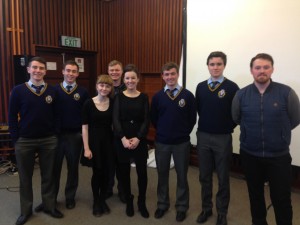
‘The Chaos of English Pronunciation’ by Gerald Nolst Trenité
Here is a poem pointed out to me by a fifth year student about the difficulties of pronunciation in the English language.
Thank you Freddie 🙂
Reading and discussion with Claire Keegan
The 5th year students have been reading Claire Keegan’s novella ‘Foster’ as part of their comparative studies. They were enthralled by the story of this vulnerable child and her first experiences of care, tenderness and affection. The story is elegant in its simplicity and yet leaves the reader with many questions.
The students had the perfect opportunity to ask those questions of Claire Keegan herself on Friday; and the answers were deeply insightful. After reading the section of the novel where the girl attends the wake and goes back to Mildred’s house, the questions began to flow. The students wanted to know about the girl’s lack of name; about the hand in the water; about the relationship between the girl and John and the girl and Edna. The discussion continued about family in general and where people find love and affection. There were many questions that Claire could not answer because she said that it was up to the reader to create their own meaning.
Overall, the discussion was insightful and philosophical and certainly gave the 5th years plenty to think about. It will be fascinating to draw parallels between ‘Foster’ and ‘The Plough and the Stars’ as we progress with our comparative studies.
